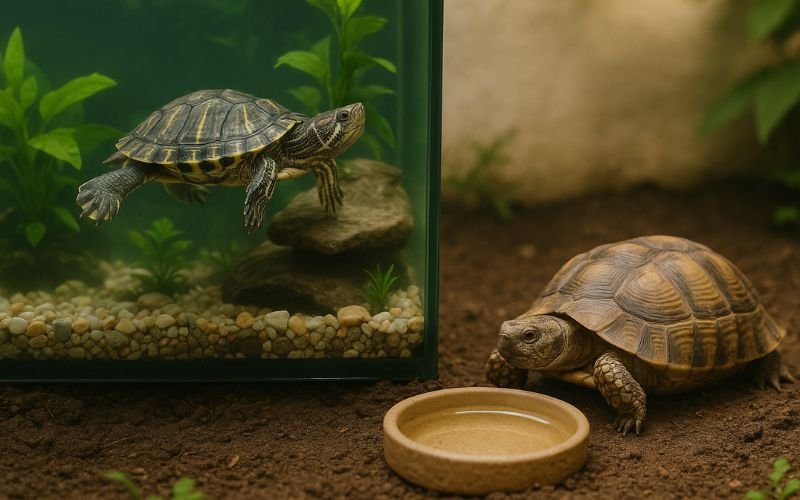- Do Turtles Need Water? - 20 July 2025
- Do Birds Have Tongues? - 14 July 2025
- Can Dogs Swim at Washington Park Denver? - 10 July 2025
Turtles are amazing animals and are one of the most beloved pets for many people. “Do turtles really need water?” you may be wondering. The first time I saw a red-eared slider basking in a pond I will never forget. It was such a joy to watch.
Absolutely, all turtles should have water, but the amount a turtle needs is dependent on the type of turtle you have. For instance, red-eared sliders are an aquatic turtle that needs to be able to swim and will spend a lot of time in water, as opposed to a box turtle that only needs some for soaking and drinking. Knowing how much you should water your turtle can help keep it happy and healthy. Let’s get into the blog.
What is Turtle Biology and Water Dependency?
Turtles are fascinating reptiles that are divided into four different species of turtle based on their living environment, aquatic and semi-aquatic. All of them have developed according to their environment, which has also affected their way of life and behavior.
All turtles require access to water to stay hydrated. This vital resource fuels their metabolic processes, which in turn promote healthy living. Turtles not only drink water, they also use it for baths which allows them to remove dead skin and keep clean. In the cases of many species, water also provides a home for hunting for food, such as a variety of species of algae, plants and small aquatic prey such as insects.
Water is required in varying amounts and forms by different turtle species. Aquatic turtles such as sliders, inhabit water throughout the majority of their life and require a complete aquatic environment for swimming and feeding. During the day, land tortoises do not necessarily need water, but they will drink if it is available and bathe in it.
Types of Turtles and Their Water Requirements
Aquatic Turtles
In this group are species like box turtles, sea turtles, and all other species of turtles that are neither semi-terrestrial nor semi-aquatic. They thrive in an environment with freshwater or saltwater for drinking, bathing and cooling. The turtles are designed for swimming and foraging in aquatic habitats.
Semi-Aquatic Turtles
Semi-aquatic turtles spend part of their time on land and part of their time in the water. They require a stable water source in which to swim, eat and drink, so it is critical to their health. They also prefer the water to be shallow, allowing them to bask in it and for the shell to get wet, which is beneficial for their health and hydration.
Terrestrial Turtles
They live on the ground and require water for hydration. They drink water by defecating and may occasionally soak in it to aid digestion. A shallow water bowl is generally all they need for hydration and they can be maintained in good health without elaborate aquatic accommodations.
Marine Turtles
Marine turtles live in the ocean and are reliant on saltwater. They’re deep divers that dive for food and come up for air. Hunting in saltwater is vital for the majority of this ecosystem’s life since everything in that particular world is saltwater-based.
Do Turtle Water Needs Change with Age?
Yes, turtle water needs do change with age. Baby turtles need a little, shallow area of water to help them eat, drink and crawl. The swim stroke enables young children to drink and swim without drowning, while also aiding in their early development.
Another critical point to note is that here, Water turtles grow up into adults ,they need more water. Adult turtles require a spacious water area in which to swim and exercise; this is critical for their wellness. The home will need to be spacious enough to accommodate these growing little teddy bears with their increased size and activity.
On balance, as turtles mature and progress through various stages of life, their water habitat requirements change to accommodate their increased size and differing swimming behavior, ensuring they have the proper environment in which to live.
Why Is Water Essential to a Turtle’s Daily Life?
- Hydration: Drink what you’re body needs to operate at an efficient level. Turtles need this to keep their systems functioning and maintain good health.
- Water and Thermoregulation: To guard against overheating and facilitate digestion, turtles require water. They thermoregulate by going into the water and because they literally cannot exist without water due to metabolism.
- Natural Behaviors: The water is an essential component in the expression of natural behaviours by turtles, such as basking and swimming. They need these activities to stay healthy, both mentally and physically.
- Skin and Shell Health: Water is essential to help the Box turtle maintain healthy skin and shell. It is good to expose them often because it helps to prevent dehydration and preserve the length of their shells, which is needed for protection and long life.
What Makes Water Quality So Important for Turtles?
Clean Water
Clean water is crucial to helping prevent toxic bacteria and parasites from clogging up the penises. In clear water, turtles are less likely to experience illnesses that result from unsanitary water. Frequent testing to pollutants and to see that the water is free from chemicals, toxins, and extreme algae is also necessary for their well-being.
Health Risks of Poor Water Quality
Poor-quality water can be a cause of numerous infections and skin conditions, including shell rot. Besides being aesthetically unappealing, shell rot on a turtle can be quite painful and lead to severe problems if left untreated. Other issues that could arise include respiratory and gastrointestinal issues, which are likely related to unsanitary living conditions.
Effective Filtration Systems
It is very important to have a good filtration system as the water must be kept clean and safe for your turtle. Quality filters help to isolate waste, toxins and harmful micro-organisms, which can cause illness. Taking care of your fish tank. Don’t forget to keep up with filter media changes and regular tank cleaning to ensure that your water conditions remain optimal and your betta remains healthy and happy.
Signs of Dehydration or Water-Related Illness
Dry, Cracked Skin or Shell
One of the most prominent symptoms of dehydration in turtles is dry skin and shell. One should have a smooth and wet shell of a healthy turtle. Cracks can cause even greater problems, including infections.
Lethargy or Decreased Activity Levels
Dehydrated turtles may be less active or may appear lethargic. If your turtle is not as active as normal, that is just downright not feeling well.
Loss of Appetite
Loss of appetite is the main symptom of ill health. If a turtle is not eating or is not interested in eating, it might be dehydrated or suffering from a waterborne illness.
Swollen or Sunken Eyes
A sunken or swollen eye can be a signal of dehydration. Regular turtles usually have clear, shiny eyes. All the more if eyes look different or in a way changed.
Frequent Basking, Avoiding Water
If a turtle is spending time out of the water, maybe because the water is too warm or too cool and it is trying to “get away” from the extremes of the temperature, or it could be dehydrated. While turtles are natural swimmers, exceeding their normal basking behavior can be a sign that something is amiss.
Is It Better to Use a Tank or an Outdoor Pond for Your Turtle?
Are you considering using a tank or an outdoor pond for your turtle? A variety of factors and considerations will influence your decision, most notably the species, size, and specific needs of the turtle.
Tank
A tank would be best for small turtles that live in the water or occasionally come out to bask. In this way, the invention maintains conditions while providing clean water and simplifying the environment.
Outdoor Pond
An outdoor pond would be ideal for larger turtles or those that prefer a more naturalistic atmosphere. It can replicate their natural environment, allowing them a large climate area for swimming & more room than any tank out there!
Dont Miss : Do Turtles Have Teeth?
Final thoughts
Choosing the right home for your turtle is critical for its well-being and happiness. Whether you choose a tank or an outdoor pond for your pet, you’ll want to spend some time getting to know your turtle’s likes and dislikes. Regular check-ups and maintenance will cut down potential health issues and aid your turtle in living a life of prosperity. By promising to look after them, you’re creating a supportive environment that’s good for their body and soul.















